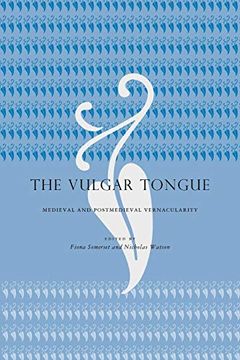Reseña del libro "The Vulgar Tongue: Medieval and Postmedieval Vernacularity (en Inglés)"
Deeply embedded in the history of Latin Europe, the vernacular ("the language of slaves") still draws us towards urgent issues of affiliation, identity, and cultural struggle. Vernacular politics in medieval Latin Europe were richly complex and the structures of thought and feeling they left behind permanently affected Western culture. The Vulgar Tongue explores the history of European vernacularity through more than a dozen studies of language situations from twelfth-century England and France to twentieth-century India and North America, and from the building of nations, empires, or ethnic communities to the politics of gender, class, or religion. The essays in The Vulgar Tongue offer new vistas on the idea of the vernacular in contexts as diverse as Ramon Llull’s thirteenth-century prefiguration of universal grammar, the orthography of Early Middle English, the humanist struggle for linguistic purity in Early Modern Dutch, and the construction of standard Serbian and Romanian in the waning decades of the Austro-Hungarian empire. Here Latin, the "common tongue" of European intellectuals, is sometimes just another vernacular, Sanskrit and Hindi stake their claims as the languages of Shakespeare, African-American poetry is discovered in conversation with Middle English, and fourteenth-century Florence becomes the city, not of Dante and Boccaccio, but of the artisan poet Pucci. Delicate political messages are carried by nuances of French dialect, while the status of French and German as feminine "mother tongues" is fiercely refuted and as fiercely embraced. Clerics treat dialect, idiom, and gesture—not language itself—as the hallmarks of "vulgar" preaching, or else argue the case for Bible translation mainly in pursuit of their own academic freedom. Endlessly fluid in meaning and reference, the term "vernacular" emerges from this book as a builder of bridges between the myriad phenomena it can describe, as a focus of reflection both on the history of Western culture and on the responsibilities of those who would analyze it.

